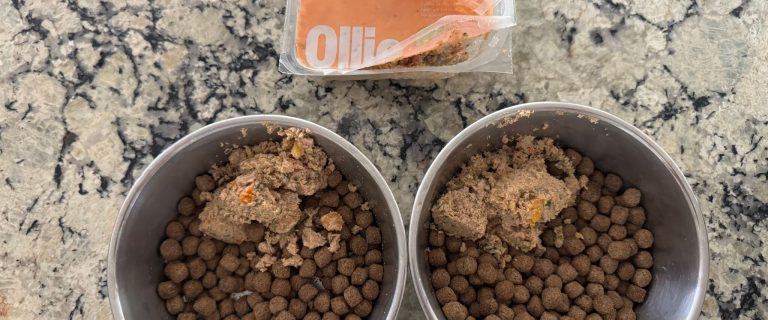I recently came across a post with an owner asking the question can dogs eat cat food. Our fellow dog parent said her dog loved a certain type of food with rabbit in it, but she couldn’t find any raw boost mixers with rabbit specific to dogs. She did find some for cats. Could she give her dog the food meant for cats?
The short answer to this is that it’s not a good idea. Can dogs eat cat food? Yes, they can. But over time you’ll be increasing your dog’s risk of GI issues as well as nutritional imbalances.
Can Dogs Eat Cat Food
A better question than can dogs eat cat food is SHOULD dogs eat cat food. The short answer to this is no. Dogs can eat cat food. It won’t poison them or cause organ damage, but they shouldn’t. Let’s talk about why.
Nutritional Differences Between Dog and Cat Food
Understanding why cat food is not suitable for dogs involves looking at the nutritional differences between the two types of pet food.
- Protein Content: Cat food generally contains higher levels of protein than dog food. Cats need more protein because their bodies are designed to metabolize it for energy and other bodily functions. While dogs also need protein, excessive amounts can lead to kidney strain and other health issues over time.
- Fat Content: Cat food is richer in fats, which are crucial for cats as they provide essential fatty acids and energy. For dogs, consuming too much fat can lead to obesity and pancreatitis, a potentially serious condition.
- Taurine: Cats require taurine, an essential amino acid, in their diet to prevent deficiencies that can lead to heart disease and other health problems. Dog food does not contain added taurine because dogs can synthesize it from other amino acids.
- Vitamins and Minerals: Cat food is fortified with vitamins and minerals in amounts suitable for cats, not dogs. For instance, vitamin A and niacin are added to cat food at higher levels, which can be harmful to dogs if consumed in large quantities.
Cat food is great for cats. It’s not so great for dogs. Cats require different amounts of protein, fat, and vitamin ratios than dogs do. So if you feed your dog cat food over a long period of time, you’ll be feeding them an imbalanced diet with too much protein and fat and an incorrect balance of vitamins and minerals. In short, it will make your dog unhealthy.
Potential Risks of Dogs Eating Cat Food
While an occasional nibble of cat food isn’t likely to cause serious harm to your dog, regular consumption can lead to various health problems.
- Digestive Issues: Long-term cat food diets for dogs can result in GI upset with symptoms like vomiting and diarrhea. Sometimes these symptoms can come on from even a small amount of cat food used as a treat. And even though cat food doesn’t cause organ damage per se, it can be difficult for a dog’s liver and kidneys to handle all that extra protein.
- Pancreatitis: Regular consumption of high-fat cat food can trigger pancreatitis in dogs. This painful condition involves inflammation of the pancreas and can lead to symptoms such as loss of appetite, lethargy, and severe abdominal pain.
- Nutritional Imbalances: Long-term feeding of cat food to dogs can result in nutritional imbalances. Dogs require a balanced diet with appropriate levels of protein, fat, carbohydrates, vitamins, and minerals. Cat food does not meet these requirements, leading to potential deficiencies or excesses that can affect your dog’s overall health.
- Weight Gain and Obesity: The higher calorie content in cat food can contribute to weight gain in dogs, which increases the risk of obesity-related health issues such as diabetes, joint problems, and heart disease.
What to Do If Your Dog Eats Cat Food
If your dog has managed to sneak a bite of cat food, there’s no need to panic. However, it’s important to monitor your pet for any signs of digestive upset or unusual behavior. Here are some steps you can take:
- Monitor for Symptoms: Keep an eye on your dog for any signs of vomiting, diarrhea, lethargy, or abdominal discomfort. If these symptoms persist for more than a day or are severe, contact your veterinarian.
- Prevent Future Access: To avoid future incidents, keep cat food out of your dog’s reach. This might involve feeding your cat in a separate room, placing the cat’s food bowl on a higher surface, or using a pet gate.
- Feed Appropriate Diets: Ensure both your cat and dog are fed diets that meet their specific nutritional needs. Consult with your veterinarian to choose the best food for each pet.
- Training: Train your dog to understand that cat food is off-limits. Use positive reinforcement to reward your dog for ignoring the cat’s food bowl.
Can Dogs Eat Cat Food? They Can, but It’s a Bad Idea
Simply put, the bodies of dogs and cats are designed differently. So the question of can dogs eat cat food is really more of a should they question. The answer to that is no. As much as our dogs love cat food, it’s bad for them, and even a few cat treats can cause GI upset.
It’s much better to abandon the question of can dogs eat cat food and start looking into a brand of dog food (or treats if that’s what you need) that your dog will enjoy. That way your dog will be happy and healthy.
Have you ever had a dog that loved cat food? How did you handle it? Tell us in the comments!
Author
-

A former Veterinary Assistant at Southwest Animal Care Hospital, Ben is an animal lover, blogger, and all-around geek. Along with writing for DogVills, Ben runs his own virtual assistant company, BizzyBim.
View all posts



